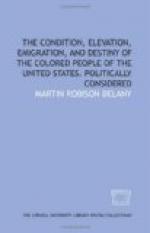When Christopher Columbus, in 1492, discovered America, natives were found to pay little or no attention to cultivation, being accustomed by hereditary pursuit, to war, fishing, and the sports of the chase. The Spaniards and Portuguese, as well as other Europeans who ventured here, came as mineral speculators, and not for the purpose of improving the country.
As the first objects of speculation are the developments of the mineral wealth of every newly discovered country, so was it with this. Those who came to the new world, were not of the common people, seeking in a distant land the means of livelihood, but moneyed capitalists, the grandees and nobles, who reduced the natives to servitude by confining them to the mines. To have brought large numbers of the peasantry at that early period, from the monarchies of Europe, to the wilds of America, far distant from the civil and military powers of the home governments, would have been to place the means of self-control into their own hands, and invite them to rebellion against the crowns. The capitalist miners were few, compared to the number of laborers required; and the difficulty at that time of the transportation of suitable provisions for their sustenance, conduced much to the objection of bringing them here. The natives were numerous, then easily approached by the wily seductions of the Europeans, easily yoked and supported, having the means of sustenance at hand, the wild fruits and game of the forest, the fish of the waters and birds of the country. All these as naturally enough, European adventurers would be cautious against introducing into common use among hundreds of thousands of laborers, under all the influences incident of a foreign climate in a foreign country, in its primitive natural state. The Indians were then preferred for many reasons, as the common laborers on the continent, where nothing but the mining interests were thought of or carried on. This noble race of Aborigines, continued as the common slaves of the new world, to bear the yoke of foreign oppression, until necessity induced a substitute for them. They sunk by scores under the heavy weight of oppression, and were fast passing from the shores of time. At this, the foreigners grew alarmed, and of necessity, devised ways and means to obtain an adequate substitute. A few European laborers were brought into the country, but the influence of climate and mode of living, operated entirely against them. They were as inadequate to stand the climate, as the nobles were themselves.
From the earliest period of the history of nations, the African race had been known as an industrious people, cultivators of the soil. The grain fields of Ethiopia and Egypt were the themes of the poet, and their garners, the subject of the historian. Like the present America, all the world went to Africa, to get a supply of commodities. Their massive piles of masonry, their skilful architecture, their subterranean vaults, their deep and mysterious wells, their extensive artificial channels, their mighty sculptured solid rocks, and provinces of stone quarries; gave indisputable evidence, of the hardihood of that race of people.




